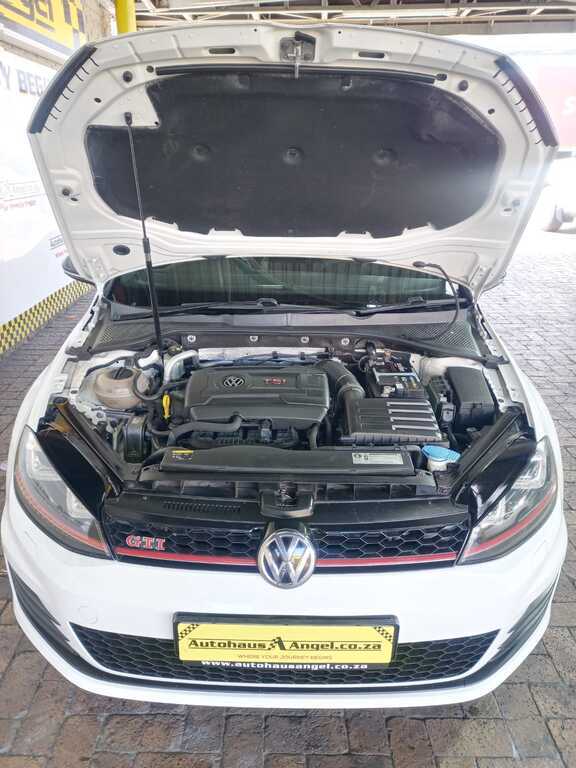A Deep Dive into the Golf 7 GTI Engine: Performance, Efficiency, and More
A Deep Dive into the Golf 7 GTI Engine: Performance, Efficiency, and More
Blog Article
Your Overview to the Golf 7 GTI Engine: Integrity and Upgrades
The Golf 7 GTI, geared up with its 2.0-liter turbocharged inline-four engine, stands for an equilibrium of performance and reliability that appeals to enthusiasts and day-to-day drivers alike. Discovering different efficiency upgrades can significantly improve both power and performance.
Introduction of the Golf 7 GTI Engine
The heart of the Golf 7 GTI is its 2.0-liter TSI engine, a turbocharged four-cylinder that delivers a remarkable blend of power and effectiveness. This engine produces a robust 220 horse power and 258 lb-ft of torque, permitting the car to increase from 0 to 60 mph in simply 5.6 seconds, showcasing its sporty personality. The turbocharged layout not just enhances efficiency yet also maximizes gas performance, making it a sensible choice for day-to-day driving.
Including innovative innovation, the engine includes straight gas shot, which improves burning performance and minimizes discharges. In addition, the Golf 7 GTI is equipped with either a six-speed guidebook or a six-speed DSG dual-clutch automated transmission, giving drivers with the versatility to pick their liked driving design. The vehicle's front-wheel-drive design, incorporated with a well-tuned suspension, makes certain nimble handling and a responsive driving experience.
Engine Dependability Aspects
Reliability is a crucial element of any kind of performance-oriented car, and the Golf 7 GTI's engine is no exception. Numerous aspects contribute to the total reliability of this extremely related to powerplant, which is vital for both day-to-day driving and perky efficiency.
To Start With, the Golf 7 GTI is furnished with a robust 2.0-liter turbocharged inline-four engine, known for its efficient layout and strong engineering. This engine includes a built steel crankshaft and light weight aluminum engine block, which provide premium strength and durability while reducing weight.
Second of all, normal maintenance plays a crucial duty in enhancing engine dependability. Sticking to the supplier's suggested service periods, using top notch lubricants, and changing important parts such as stimulate plugs and filters can considerably expand engine life.
In addition, the top quality of gas made use of can additionally influence reliability. Costs fuel is suggested to make sure ideal performance and decrease the threat of knocking or ignition.
Lastly, the vehicle's electronic monitoring system continually keeps an eye on engine parameters, allowing for real-time modifications to maximize performance and effectiveness while safeguarding versus potential issues. Collectively, these variables highlight the Golf 7 GTI engine's credibility for dependability amongst enthusiasts and everyday vehicle drivers alike.
Common Problems and Solutions
The Golf 7 GTI, while celebrated for its performance, is not without its challenges. Among the most regularly reported issues are engine oil usage and turbocharger failings, which can dramatically influence automobile dependability. Comprehending these usual issues and their solutions is necessary for keeping optimal engine efficiency.

Engine Oil Usage
While many fanatics value the efficiency of the Golf 7 GTI, engine oil intake can become a notable problem. Proprietors may discover that their vehicles call for even more frequent oil top-ups than anticipated, typically credited to different elements inherent in the engine's layout and operation.
One common problem is the engine's direct fuel shot system, which can result in raised oil usage due to the burning procedure. Additionally, using high-performance driving habits can exacerbate oil burn-off, especially under hostile throttle conditions. Vehicle drivers might also experience oil leakages from seals and gaskets, which can add to lowered oil levels.
To resolve oil intake, routine upkeep is critical. Routine oil modifications using premium synthetic oil can aid preserve ideal engine efficiency and longevity. Keeping an eye on oil degrees and performing timely checks can prevent potential issues before they rise. If too much usage continues, it might be suggested to speak with a specialist technician to evaluate the engine for prospective interior issues, such as worn piston rings or valve seals. Adopting these methods can dramatically minimize problems pertaining to oil consumption in the Golf 7 GTI, making certain a much more satisfying and reliable driving experience.
Turbocharger Failings
Turbocharger failings can considerably influence the efficiency of the Golf 7 GTI, leading to diminished power and effectiveness. Oil leakages frequently stem from used seals or harmed gaskets, which can lead to oil contamination and subsequent engine damages.
One more common problem is wastegate failure, which can lead to overboost or underboost conditions. If left untreated, this not only affects the automobile's performance however can additionally lead to serious engine damage. Upgrading to a much more durable wastegate can boost dependability and efficiency.
Excessive shaft play suggests wear in the turbocharger's bearings, which can result in a complete turbo failure. Monitoring boost pressure and paying attention for uncommon noises can assist detect this trouble early.
To stop turbocharger failings, regular maintenance, including oil adjustments and air filter replacements, is crucial. Furthermore, purchasing premium aftermarket components may provide enhanced dependability and efficiency, eventually improving the driving experience of the Golf 7 GTI.
Efficiency Upgrades to Consider
What performance upgrades can absolutely elevate the driving experience of a Golf 7 GTI? To unleash the full possibility of this legendary warm hatch, a number of targeted adjustments can boost power, taking care of, and total driving pleasure.
One of one of the most efficient upgrades is a high-performance turbocharger. Changing the stock system with an aftermarket option can dramatically raise horsepower and torque, supplying a much more thrilling acceleration experience. Complementing this upgrade with an efficiency intercooler helps keep optimum temperatures, making certain constant power distribution.
Next, think about updating the exhaust system. A much less restrictive exhaust not just enhances engine efficiency yet additionally generates a much more aggressive sound that amplifies the auto's stylish personality. Matching this with a remapped ECU will certainly maximize fuel delivery and ignition timing, further enhancing performance.
Suspension upgrades, such as adjustable coilovers, can improve managing by reducing the automobile's center of mass and decreasing body roll. In addition, a collection of high-performance tires will boost grasp, enabling for sharper cornering and boosted general stability.
With each other, these upgrades can transform the Golf 7 GTI into an extra vibrant and thrilling driving device, making every trip an unforgettable experience. golf 7 gti engine.
Suggested Upkeep Practices
Maintaining the Golf 7 GTI engine calls for interest to key practices that make sure ideal performance and durability. Routine oil changes are crucial for engine wellness, while timely timing belt replacement is vital to avoid potential failings. Applying these upkeep practices will certainly assist maintain your car running smoothly and effectively.
Normal Oil Changes
Regular oil adjustments are necessary for the optimal efficiency and longevity of the Golf 7 GTI's engine. Preserving a constant oil change timetable ensures that the engine operates efficiently and effectively. The advised interval for oil adjustments is usually every 5,000 to 10,000 kilometers, depending upon driving problems and the kind of oil made use of.
Utilizing high-grade artificial oil is important as it supplies superior lubrication and thermal stability contrasted to standard oils. This is specifically important for the Golf 7 GTI, which includes a turbocharged engine that generates greater operating temperatures. Routine oil adjustments aid to get rid of pollutants and sludge build-up, which can compromise engine performance and bring about early important link wear.
In addition, fresh oil boosts fuel effectiveness and reduces dangerous exhausts, adding to a cleaner setting. During the oil adjustment process, it is also recommended to change the oil filter to make sure optimum purification and prevent any type of particles from going into the engine. Sticking to these practices not just helps maintain the engine's integrity yet additionally preserves the value of the car, making routine oil transforms a crucial aspect of accountable GTI ownership.
Timing Belt Replacement
The timing belt is an essential component of the Golf 7 GTI's engine, responsible for integrating the rotation of the crankshaft and camshaft. This synchronization is important for ideal engine efficiency and effectiveness. If the timing belt stops working, it can result in catastrophic engine damage, making prompt replacement crucial.

When intending a timing belt substitute, it is recommended to additionally change the water pump and tensioner. These components work in conjunction with the timing belt and often experience comparable wear, ensuring optimal efficiency and durability. Using OEM components is advised for their dependability and compatibility with the Golf 7 GTI's engine.
Professional setup is extremely urged, as inappropriate setup can result in extreme engine breakdowns. Regular maintenance of the timing belt not just shields the integrity of the engine yet additionally improves the overall driving experience of the Golf 7 GTI. golf 7 gti engine. Prioritizing this task assists keep vehicle dependability and performance gradually
Aftermarket Parts and Adjustments
Countless lovers turn to aftermarket alterations and components to boost the efficiency and aesthetic appeals of the Golf 7 GTI. These upgrades can dramatically boost the automobile's responsiveness, handling, and overall driving experience. Popular modifications include high-performance air consumptions, exhaust systems, and intercoolers, which can enhance horsepower and torque by maximizing air intake and exhaust flow.
Suspension upgrades are likewise prevalent, with options varying from reducing springs to totally flexible coilover sets that boost ride high quality and cornering capability. Updated brakes, consisting of performance pads and rotors, can offer far better stopping power, making have a peek at this site certain security and control during spirited driving.
Aesthetic alterations, such as aftermarket wheels, body sets, and customized lighting, allow owners to customize their cars while maintaining a stylish appearance. Engine tuning, whether via ECU remapping or standalone engine administration systems, can open added efficiency potential, making the GTI a lot more exciting to drive.
While aftermarket alterations can yield considerable benefits, it's necessary to choose credible brand names and consider the prospective effect on guarantee and integrity. Proper installment and tuning are important to ensure the long life of the automobile while enjoying the improvements.
Enhancing Fuel Efficiency
Improving fuel performance in the Golf 7 GTI can bring about substantial price savings and a lowered environmental influence. Achieving much better fuel economy requires a mix of driving behaviors, maintenance practices, and calculated alterations.
One effective approach is adopting a smooth driving design, avoiding rapid acceleration and heavy stopping, which can considerably decrease fuel consumption. Preserving optimal tire stress is also crucial; under-inflated tires can raise moving resistance, leading to lowered efficiency. Normal servicing, including engine adjusting and air filter replacements, ensures that the engine operates at peak efficiency, even more enhancing gas economic climate.
For those seeking upgrades, take into consideration a performance tune that concentrates on effectiveness rather than sheer power. Eco-mode settings, if offered, can adjust throttle response and change indicate make best use of gas financial savings. In addition, lightweight aftermarket wheels can minimize weight and boost efficiency without compromising performance.
Last but not least, employing aerodynamic enhancements, such as a front splitter or rear spoiler, can reduce drag at greater speeds, adding to far better fuel economic climate. By applying these approaches and adjustments, Golf 7 GTI proprietors can take pleasure in enhanced gas efficiency while preserving the lorry's perky driving features.
Conclusion
In conclusion, the Golf 7 GTI engine exemplifies a blend of efficiency and integrity, driven by a well-engineered 2.0-liter turbocharged inline-four. Numerous efficiency upgrades and aftermarket modifications can enhance driving experience while keeping dependability.
The Golf 7 GTI, geared up with its 2.0-liter turbocharged inline-four engine, stands for a balance of performance and integrity that appeals to enthusiasts and day-to-day motorists alike. Regular oil adjustments utilizing high-grade synthetic oil can aid preserve optimal engine performance and durability.Normal oil changes are crucial for the optimum efficiency and durability of the Golf 7 GTI's engine. Regular maintenance, including engine tuning and click here for more air filter substitutes, guarantees that the engine operates at peak efficiency, additionally boosting gas economic situation.

Report this page